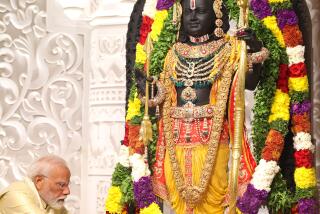Democracy and Islam
- Share via
Re “Can Fundamentalist Islam and Democracy Coexist in a Country?” Commentary, March 20: I find Ausaf Ali’s assertion that Islam and democracy are incompatible to be an odd one. In the past year we have seen democracy sweep forth in two major Muslim countries--Iran and Indonesia--both leaders running on a platform of a balanced adherence to the faith (Mohammad Khatami in Iran and Abdurrahman Wahid in Indonesia). Their respective struggles have demonstrated how Islamic governance requires the same basic elements of democracy.
Furthermore, Ali’s assertion that “nothing could have been more irrelevant to [Muhammad’s] rule than the consent of the governed” is the antithesis of historical fact. There are just too many examples in Islamic history to quote here, but suffice it to say, Prophet Muhammad set forth a model of governing that accounts for the dynamics of a changing society while still adhering to the timeless principles and values set forth by Islam.
OMAR RICCI
Glendale
*
The incoherency of Maher M. Hathout’s March 20 commentary comes through in his misrepresentation of the problem of the relation between religion and state.
We have a democracy (in principle) because we can change the Constitution (by the expressed will of a “vast majority” of two-thirds) without interrupting the continuity of democracy itself. Can the Koran be altered without suspending the law of Islam? Yet inalterable book-law rules a “fundamentalist” state by definition, which is why a true democracy must make no law “respecting” (or forbidding) any religion. Thus there can be no such thing as a democracy that would be religious (e.g. Christian or Muslim or Jewish) in its principles.
Such a fundamentalist state would have to put the “law of God” as written once and for all above the people’s law, always modifiable, of democracy.
PETER CANNING
Burbank


